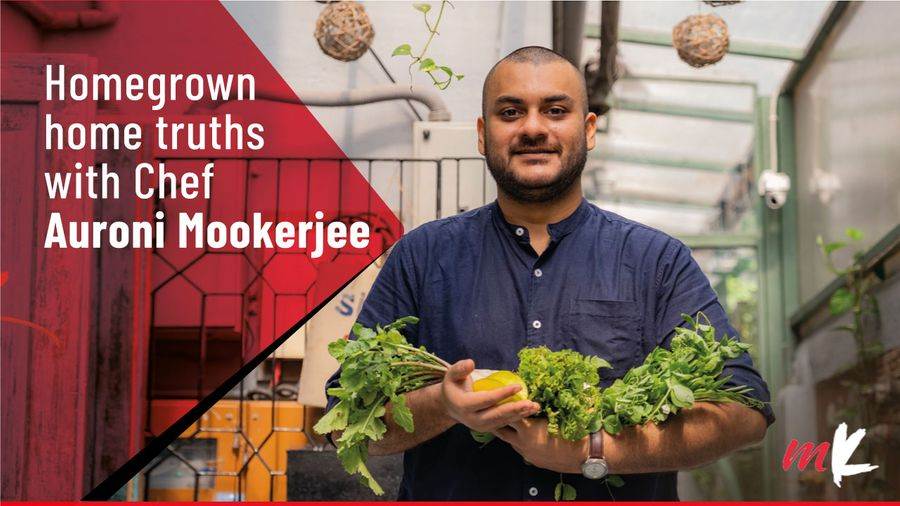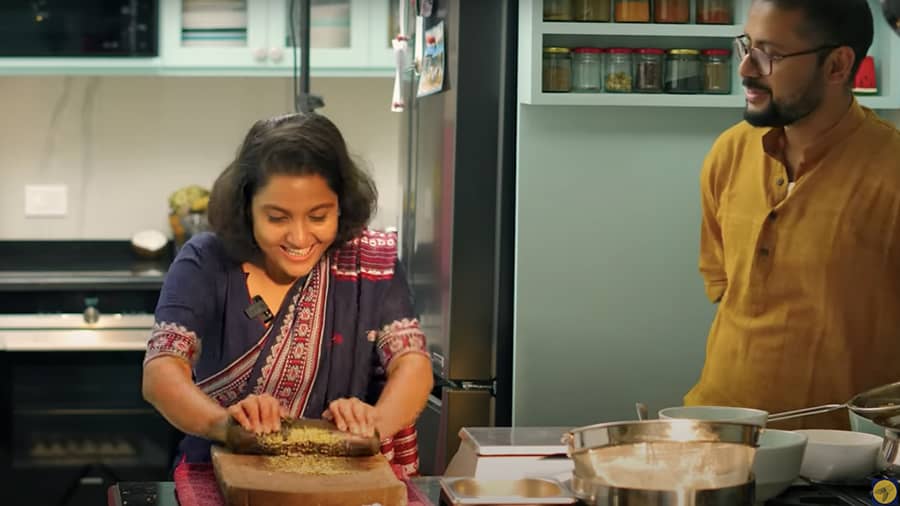Last week, when the Michelin-starred restaurant-owning Roni Mazumdar met Sienna Cafe’s Shuli Ghosh, he told her about a recommendation he’d been given during his brief visit to his hometown: “I was told that if there’s one place I should eat at while in Kolkata, it is Sienna Cafe.”
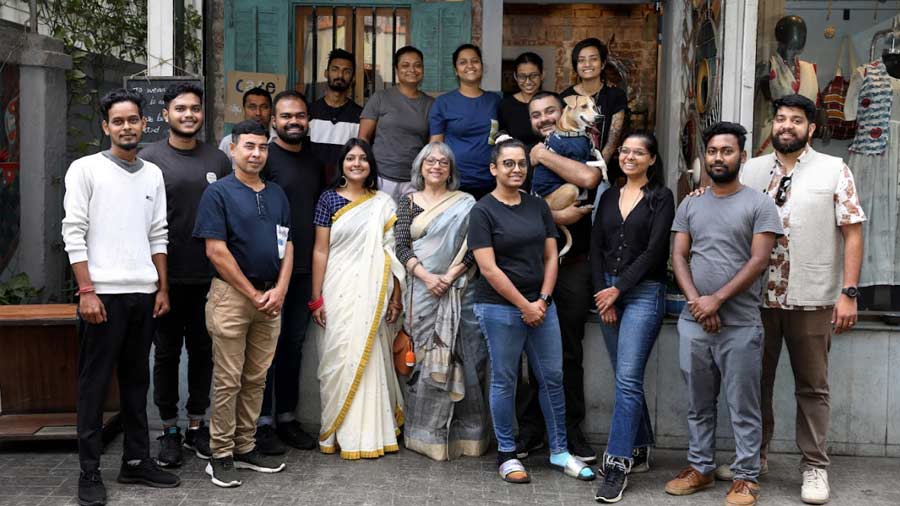
That is not just high praise; it is also sound advice. In a city where diners’ tastes often tend to be fixed, thereby dictating the broad (and relatively predictable) directions taken by several players in the restaurant scene, the Sienna kitchen has achieved something unique and, one daresay, elusive: a culinary output that foregrounds Bengal and its mind-boggling range of seasonal produce while also pushing the envelope in terms of creativity and craft. It is not enough to say that their food is delicious or nourishing; it is also intelligent, and – very importantly – never boring.
Several factors have led to this. The first, of course, is the wealth of produce a kitchen team like Sienna’s can find to work with: produce found in abundance in the treasure troves that are Kolkata’s bajaars. Equally important are leaders who inspire the sort of goodwill, imagination and artistry that play a crucial part in how success is defined in restaurant operations.
Most significant – and this is a natural extension of the previous point – is the Sienna team’s focus on creating a kitchen environment that, for all its strains, deadlines and cortisol-elevating pressures, is a happy place to work in. The last-mentioned is a pipe-dream in most workplaces in competitive industries, with the restaurant sector touted to be particularly ruthless. Yet, the team at Sienna Cafe seems to have cracked it.
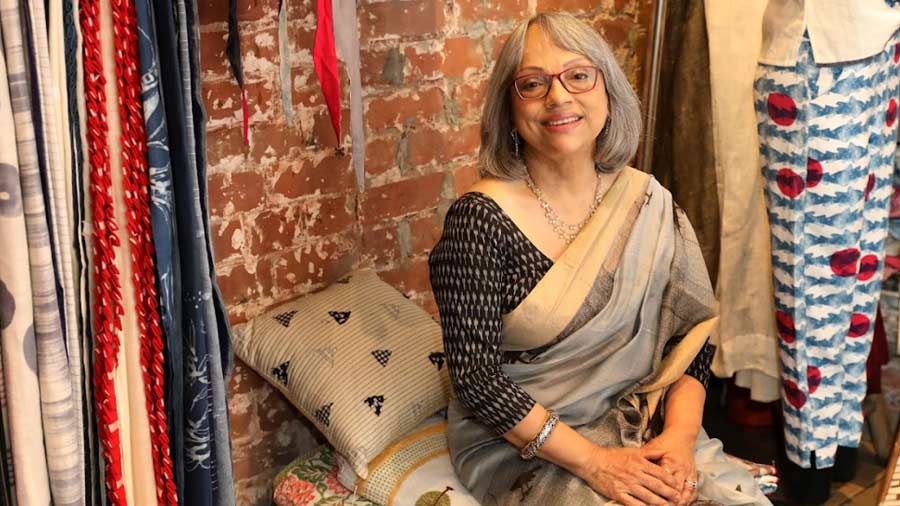
The founder and proprietor of Sienna, Shanta Ghosh
The Santiniketan story
But the genesis of Sienna wasn’t in Kolkata – it was in Santiniketan, where architect Shanta Ghosh, along with sculptor and author Prabhas Sen, set up Confetti, a handicrafts workshop that was geared towards empowering Bengal’s artisans. “It all started in my mid-20s with Mahamaya, an exhibition of crafts from eastern India, organised by the Crafts Council of West Bengal and displayed at Philadelphia’s Port of History Museum,” said Shanta, the founder and proprietor of Sienna. “I was tasked with helping the 12 artisans who had gone to Philadelphia as representatives of different indigenous art forms from the eastern part of our country.”
Having always been drawn to the arts, her experience at the exhibition not only inspired her as an architect, but also served as an introduction to the goings-on in Bengal’s crafts arena. “It showed me how I can incorporate indigenous craftwork into interiors and architecture so that an economic base is created for the artisans to sustain their craft,” Shanta said. On a trip to India in 1989 – Shanta lives in the United States – she visited Prabhas in Santiniketan. With his help, guidance and connections with local potters, Shanta set up the Santiniketan workshop, which eventually turned into a large factory made with eco-friendly materials – ferrocement, compressed earth blocks, grilles and metal instead of wood for doors and windows – housing several more potters.
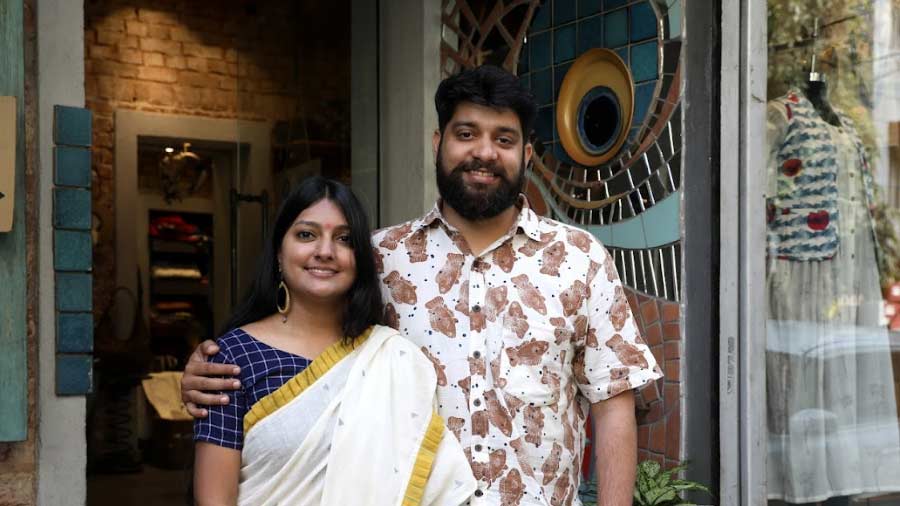
Co-founder and creative head of Sienna, Shuli Ghosh, with husband and business head, Rewant Lokesh
Enter, the A-Team…
Shuli Ghosh, too, would gravitate towards her mother’s passion project when she returned to India after completing her graduation in the US; her aim was to render the pottery unit more organised and streamlined so that it could become self-sustaining, especially for the women artisans who have traditionally not been allowed to work on the wheel in Bengal.
“My mother and I started having long conversations about the potential of the Santiniketan workshop, and somewhere I realised that I’m not leaving Kolkata,” recalls Shuli, co-founder and creative head of Sienna. “I wanted to stay here and work with artisans; it gave me a sense of purpose and a creative outlet.” This was around the time when they started looking for a space to open a ceramics and wooden handicrafts store in Kolkata – a space that would eventually become the Hindustan Park outlet of Sienna Store and Cafe.
How did the cafe part come about? “We thought we would add a simple cafe where people could grab some coffee and snacks after shopping at the store,” said Shanta. That cafe received such a tremendous response from the store’s customers that the need to bring in a professional kitchen team was keenly felt. And, in a happy chain of events, Shuli met Rewant, who would go on to become her husband and, with his marketing background and education, Sienna’s business head. Rewant, in turn, introduced the Ghosh family to Auroni Mookerjee, who would soon become Sienna’s executive chef and bring along with him Avinandan Kundu, Koyel Roy Nandy and Milan Ghosh – the foundation of the Sienna kitchen team as it stands today.
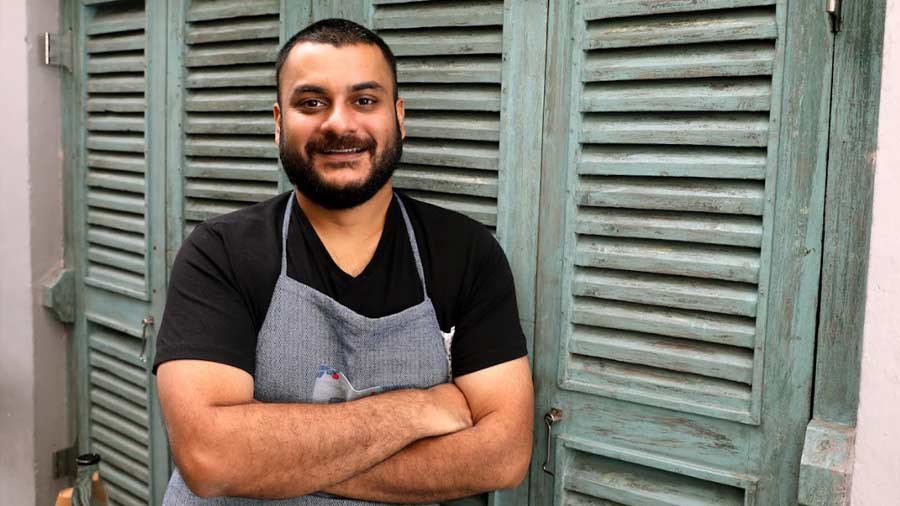
Executive chef and general manager, Auroni Mookerjee
From bajaar to table
In many ways, thus, the driving force of Confetti and Sienna Store – supporting the indigenous artwork of Bengal’s artisans and helping them monetise their skills – was translated into the Bengal-forward approach of Sienna Cafe: a perspective that informs their ‘baajar-to-table’ ethos, celebrating the sheer abundance, variety and freshness of the state’s produce. “That is our team’s aim – to explore, study and work with everything our state has to offer: vegetables, fruit, fish, and so on,” says sous chef Milan Ghosh, who has worked with Auroni since 2016 (and who was once famously credited with possessing the skill to turn anything into gnocchi). “We work with what’s fresh, seasonal, locally grown, and of the land,” says line cook Diptajit Chowdhury, reflecting the vision that is shared by senior kitchen members and younger cooks alike. “I was intrigued with what Sienna does, because we also interpret other cuisines using the local produce we have.”
The pandemic did play a large part in bolstering this vision – especially since Auroni joined Sienna right before the lockdown. “In a way, it was the perfect time to bring Auroni on board,” says Rewant. “Not only was he a friend whom we trusted, but our visions, with regard to proudly representing Kolkata and Bengal, aligned.” This partnership, coupled with the financial and creative deadlock Sienna found itself in on account of Covid, galvanised the team into working as a unit and thinking creatively. The outcome? Bajaar-inspired weekend special menus that gave many in the pandemic-ridden city a reason to smile, and continue into the present day as weeklong specials. “Back then, everyone on the team was doing the food deliveries,” recalls Rewant. “That also served as a great bonding exercise for us.”
Apart from the bonding, this also gave people a glimpse into a rare kitchen ethos – an equitable distribution of work and all hands on deck, especially during a crisis.
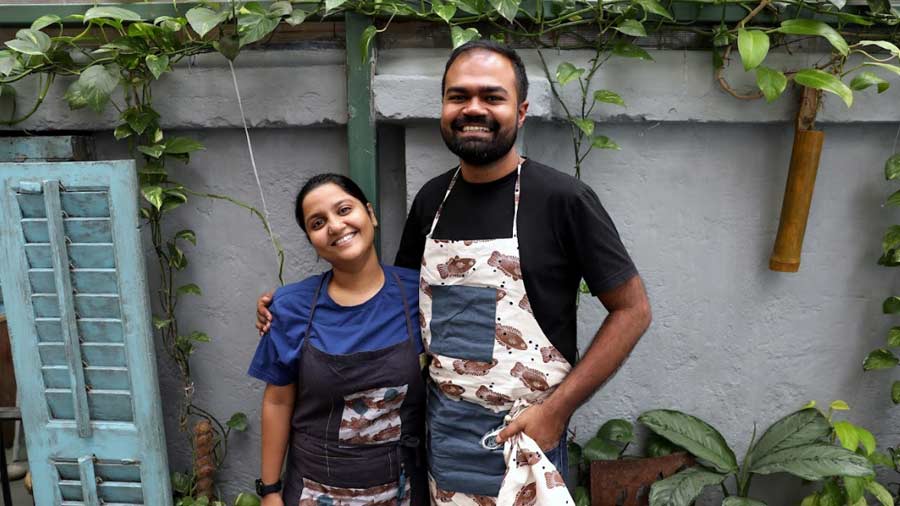
Senior sous chef, Koyel Roy Nandy, and head chef, Avinandan Kundu
That, perhaps, is one of the many factors contributing to the happiness in the kitchen that Auroni, Avinandan and Koyel strive to create – and to which the younger chefs attest. “It was one of the best decisions of my life to join Sienna,” says Kirti Agarwal. “Not only are we very mindful about what we put on the plate, but the supportive work culture we have here is unique. Everyone is uplifting each other.”
“While Sienna’s ingredient-based research is the main thing that drew me to it – we do a specials menu every week – I realised after I joined that the environment here is like that of a family,” says Ankita Gupta, who has worked previously at The Bombay Canteen and Michelin-starred Gaa in Bangkok. Pritha Basu, who admits that the first things she really liked about Sienna were “the pretty blue ceramic tiles”, recalls an article in the Hindustan Times about Auroni and Avinandan that piqued her interest, after which she found out that they are both at Sienna. “I applied to Sienna and didn’t think they would ever respond; but Chef Avinandan did, the very next day!”
A unique operation, a safe space
To create outstanding food and a conducive kitchen environment is something that Auroni, a former advertising man, and Avinandan, a former lawyer, know well.
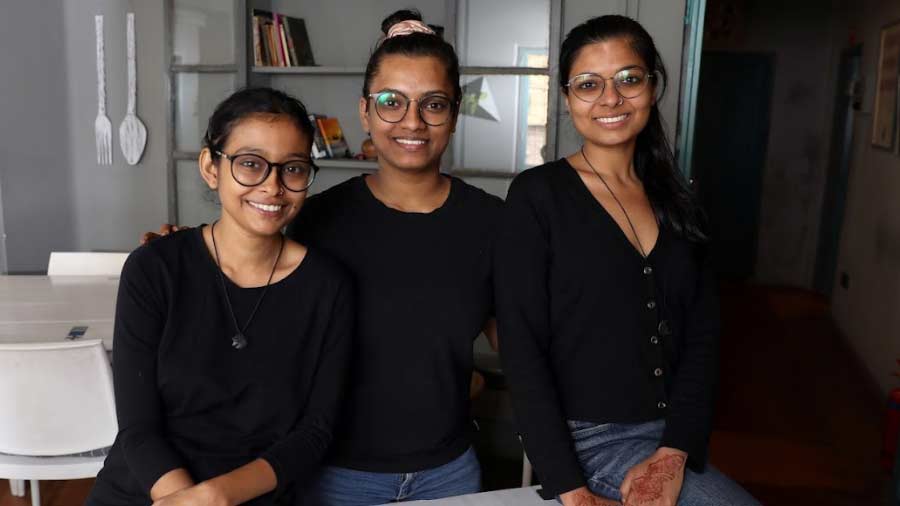
(L-R) Line cook, Pritha Basu, and chefs de partie, Ankita Gupta and Kirti Agarwal (all of whom, incidentally, discovered Sienna Cafe via Instagram)
“Auroni, Koyel and I agreed on the principle of running a happy kitchen, and a teaching kitchen,” says Avinandan. “When I worked in Paris, we were taught to say ‘Yes, Chef’ to everything without question. At Sienna, I tell my team that they should ask me why I’m giving them a particular instruction; if I don’t have an answer to that question, I am not in a position to be telling anyone what to do. In that sense, we run a unique operation – one that has its challenges, but where Koyel and I both learn on the job every day.”
Senior sous chef Koyel, who previously worked with Auroni at DIVA in Delhi, concurs. “We work with a very young, knowledgeable team, and are always thinking about how to create an environment that they find motivating,” she says. Having studied hotel management and worked in hotel settings, she is familiar with the fraught atmosphere in star kitchens. “Sienna, to me, is a safe space,” she says. This is no mean feat for a successful restaurant – especially at a time when several restaurant operations in India and the world are being called out for the way in which they treat their employees.
Magic realism: From Bengal to the Sienna kitchen
There are, indeed, several things that even I have learnt to question during my conversations with Auroni and Avinandan – including the insidious ways in which we denigrate the labour of our mothers, aunts, grandmothers and family cooks when we say, “Why should I pay so much money at a restaurant for something I can easily get at home?” Avinandan had once memorably said that the reason why a common food item might cost Rs 500 at a restaurant is because there are overheads to consider and rent and salaries to pay. (“Just because someone’s mother can cook something within a specific budget doesn’t mean restaurants have to price it the same way. In fact, if we did actually have to pay our mothers what they deserve for the efforts they put into cooking, our concept of both labour and food would change.”)
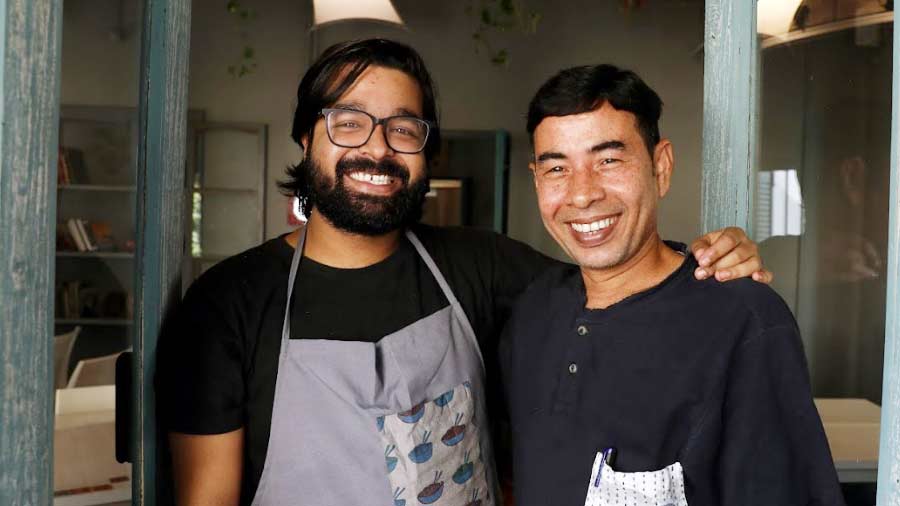
Line cook, Diptajit Chowdhury, and sous chef, Milan Ghosh
“We constantly talk about the fact that we are a family here,” says Auroni. “The truth is that this is a kitchen for everyone – the lack of a chef-school background should not prevent you from being hired in a good kitchen. I, in fact, did not go to culinary school! And within this family environment, I believe that our cooking has only grown stronger; it is reflected in the love we see in our diners’ eyes. That, to me, is the ultimate validation: it’s almost as if we’ve taken the magic realism of Bengal and instilled it in our cooking.”
The final word goes to Shuli. “When Sienna started taking off, I realised how important it was to not just maintain the quality and consistency of our output, but to also tell stories: of the region, and of the people who cook the food…. We are very proud of our Sienna family!”
